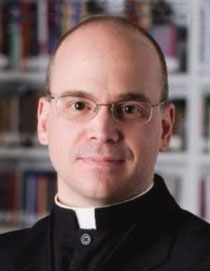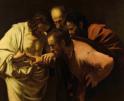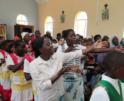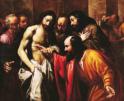
Faith

Grunow
"In these days, therefore, let us add something beyond ordinary expectations of our service. Let each one, over and above the measure prescribed, offer God something of his own freewill in the joy of the Holy Spirit." (Rule of St. Benedict, sixth century)
Tomorrow is Ash Wednesday and with this commemoration the Church begins the penitential practices of Lent. What are penitential practices? Penitential practices are virtuous works through which we demonstrate the sincerity of our profession of faith and discipline our desires so that we might better serve the mission of the Church.
What is Lent?
Lent is an extended period of time during which the Church prepares herself to celebrate the great mysteries of Holy Week. During Holy Week, the Church recalls the suffering and death of the Lord Jesus and celebrates the startling revelation of his Resurrection from the dead. The culmination of Holy Week is presented in three days of intense prayer and worship: Holy Thursday (the Church commemorates the gift of the Blessed Sacrament and the priesthood); Good Friday (the Church mourns the death of the Lord Jesus, but also celebrates the event of Christ's death as the fulfillment of the Incarnation); and the ritually evocative vigil Mass on Holy Saturday, in which the Church marks and remembers the joyous and startling revelation of Christ's resurrection from the dead. The day of the Lord's resurrection from the dead, commemorated with the vigil on Holy Saturday and at the Masses on Sunday, is popularly known as Easter.
It is important to remember that the preparation of Lent is not simply meant to inculcate in the faithful faith-based ethics or self-improvement, but to prepare us for worship. The reception of ashes is not intended to be a sign of a vague, cultural association with the Catholic Church, but an external reminder that from the day of Ash Wednesday forward, you are preparing yourself for the awe-filled observances of Holy Week.
Just as the season of Advent prepared the Church for the celebration of the revelation that God in Christ accepted a human nature and allowed himself to be born into this world in the same manner we are born into the world, in its own way the season of Lent prepares the Church for a revelation that was implicit in Christ's birth: that in his acceptance of a human nature, God in Christ accepted for himself the experiences of the facts of suffering and death.
The Incarnation is not a kind of ruse, in which God in Christ revels in only positive experiences and exempts himself from what is negative and off-putting. Instead, in his Incarnation, God in Christ reveals himself as present to us in all things, in all of life, even in the experience of death.
If this has ceased to astound us, we have likely allowed ancillary concerns to cloud our vision of the Gospel.
Lent prepares us to let go of the superficiality and lack of attentiveness that can so often inhibit our appropriation of the Church's faith. Heightened attentiveness and intensified reflection concerning the startling culmination of Christ's Incarnation in suffering, death, and resurrection highlights that what is revealed to us in Christ are not merely ideas about God or feelings of a spiritual nature, but how God has chosen to relate to us in the most extraordinary, unexpected, and undeserved way.
The Church asks us to accomplish three practices that are integral to our observance of Lent: prayer, fasting, and almsgiving.
What does all this entail?
Prayer is essential to the life of faith, and by prayer, the Church does not invite us to simply be alone with our thoughts. Prayer is placing oneself at God's disposal. What must we do? Wait and wonder. What will God do? That is up to him. As such, prayer is essentially an expression of a disposition to trust God's purposes.
This disposition of trust expresses itself liturgically (in the formal prayer of what is called the Divine Office and in the Mass) and devotionally (examples of which are practices like the Rosary or the Stations of the Cross). In the Divine Office, the faithful pray in communion with Christ in the words of the Psalms, words which Christ himself knew and prayed. In the Mass, we receive not merely words, but Christ's divine life and presence, given to us in the Blessed Sacrament. Without liturgical and devotional prayer, attempts at prayer quickly degenerate into self-reference.
Through fasting we deprive the body of food. Why? Fasting is an exercise in detachment from something that we consider to be necessary and a source of comfort. The experience of deprivation that comes from detachment compels us to consider how worldly things and preoccupations are so easily elevated to ultimate concern and become rivals to God. Oftentimes the most insidious forms of idolatry happen when our assent to an idol is tacit, rather than blatant. Fasting provokes us to a relentless test of our sincerity. Whereas prayer insists on trust, fasting insists on authenticity. What sacrifice do we offer and to whom? Is it the one, true God or some other worldly thing, concern, or power?
Further, fasting toughens us for mission. In a conscious and deliberate attempt to deprive ourselves small things, we prepare ourselves for the occasions when we will be asked to deprive ourselves of greater things. All this is accomplished for the sake of the mission Christ gives to us. His mission, our mission, is love, and love always necessitates a sacrifice.
Finally, we are asked to give alms. Almsgiving is more than just allocating surplus funds to a charitable organization or cause. More is expected of us than that! Think of almsgiving as acts of generosity that enable the performance of the corporal and spiritual works of mercy. It is through the corporal and spiritual works of mercy that we show ourselves to be faithful, rather than accidental, disciples.
Ours is an age of scandals, and one of the great scandals that has become a stumbling block to so many in terms of the faith is that too many of the faithful have come to believe that the performance of the works of mercy is a matter of delegation. We make the works of mercy works for hire and exempt ourselves from having to actually do them ourselves. Not so! The works of mercy cannot be delegated. We each have to do them, and it is through our participation in the works of mercy that almsgiving is fulfilled.
Almsgiving places a demand on us to receive Christ as he presents himself to us in his poor. This can be an off-putting experience because Christ arrives in his poor on his own terms. Our place, once he makes his presence known, is not to control, but to serve. And as in his poor Christ takes the lowest place, we are compelled to take our place beneath him as servants of the One who makes himself a slave. The performance of such service often resists offering to us the kinds of consolations that we might expect from our service to the Lord, but it is precisely in this that our service becomes efficacious. We learn from this experience how to imitate Christ's generosity, who gave to us fully knowing that what he gave was undeserved, could not be reciprocated, and would be unappreciated by many. It is in imitation of Christ's service and acceptance of his conditions that our own service is perfected.
Almsgiving is also a reminder of our own mortality, inasmuch as all worldly goods will be surrendered at the moment of death. Rather than building ever greater storehouses for our possessions, we give what we have away. That we do so incrementally prepares us for the surrender of all worldly goods that will ultimately come.
Prayer. Fasting. Almsgiving. None of these are ends in themselves. Instead, each is a way, a way that is opening us up to the Church's spiritual passage into the great mysteries of Holy Week:
"Remember, thou art dust
And shall to dust return:
Then place not in the world thy trust,
Its delusions spurn;
Prepare thee for the mighty change
Impending over all;
Give to thy thoughts a loftier range
And heed Heaven's call."
(J. Beste, nineteenth century)
- Father Steve Grunow is a priest of the Archdiocese of Chicago. He serves as CEO and Executive Producer for Bishop Robert Barron’s Word On Fire Catholic Ministries.
He writes on theology, movies, and popular culture for the Word on Fire blog.
Recent articles in the Faith & Family section
-
Wounds, not scarsJaymie Stuart Wolfe
-
A special collection in the liturgy libraryFather Robert M. O'Grady
-
Witness to a Transfiguration in KenyaMichele Miers
-
Understanding the ScripturesScott Hahn
-
'Cabrini' does extraordinary job of bringing saint to lifeBishop Nicholas DiMarzio


















